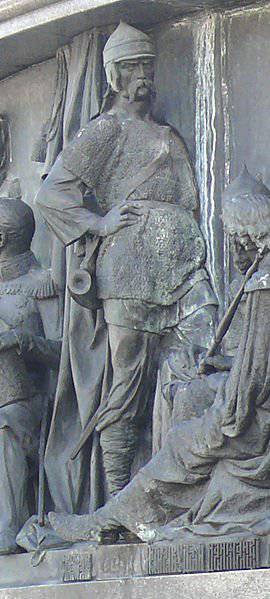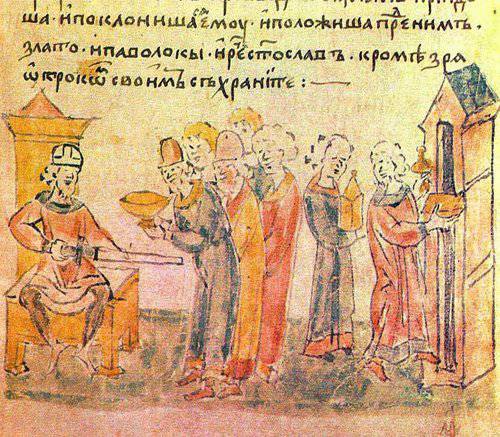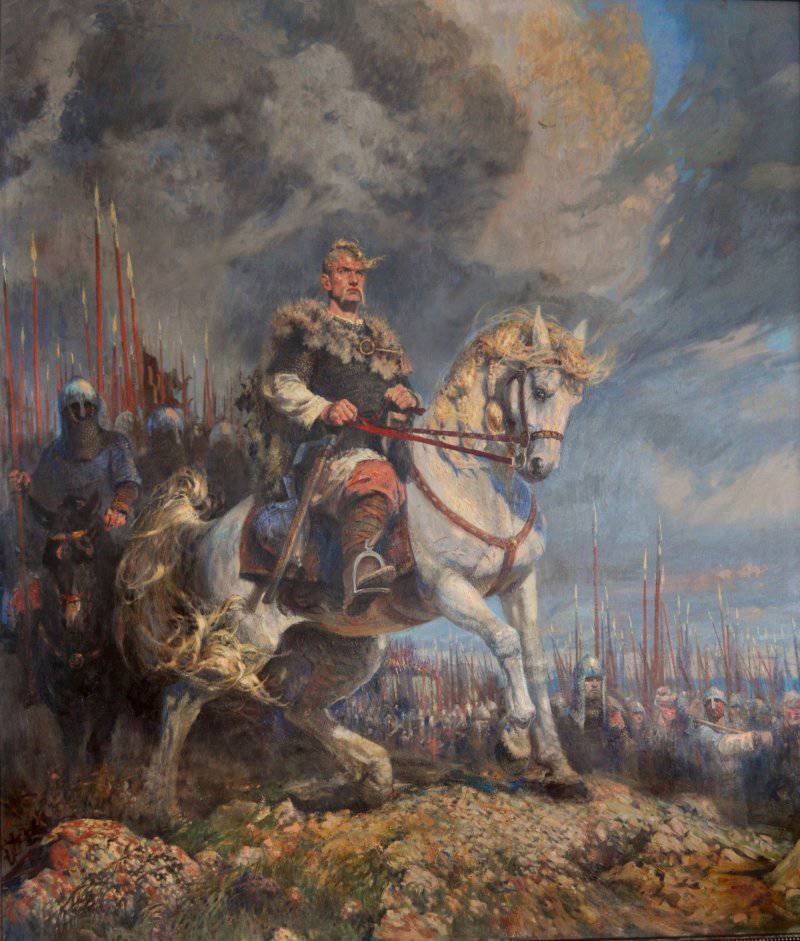Bulgarian campaign Svyatoslav. 2 part
 First Danube trip
First Danube tripIn 967, the Russian prince Svyatoslav marched to the shores of the Danube. In the annals there are no reports on the preparation of this campaign, but there is no doubt that the preliminary preparation was carried out in earnest. New warriors were prepared, of which there were even more, they gathered from the Slavic “war” tribes (volunteers-hunters who went to war of their own accord, hunting), built a significant number of rooks, on which it was possible to walk along the rivers and cross the sea, forged weapon. The Russian army, as in the campaign against the Khazaria, was mostly on foot. The speed of movement was achieved through the use of rooks and the presence of a developed network of waterways in Eastern Europe. In addition, Prince Svyatoslav Igorevich had easy allied cavalry, if the Pechenegs took part in the campaign against the Khazars, now the Hungarians (Ugrians) also became allies.
Diplomatic training was completed. In 967, a secret treaty was concluded between the Byzantine Empire and Russia (the Russian chronicler did not say a word about its content). From Byzantium Calokir signed him. Constantinople, in exchange for the security of its possessions in the Crimea and the Northern Black Sea region, yielded to the Russian state the mouth of the Danube. Prince Svyatoslav was to receive the seaside region of the Dniester and the Danube, the territory of the present Dobruja. It was the town of Pereyaslavets on the Danube that was originally the main goal of Svyatoslav Igorevich.
Russ did not immediately appear in Bulgaria. At first, the Ruses, according to the information of the Russian historian V.N. Tatishchev, who possessed lost chronicles and other materials subsequently, moved up the Dniester River. There they were waiting for the Hungarian allies. Hungarians for several decades were allies of the Rus. “From the Ugrians, Tatishchev wrote, he had a strong love and agreement.” Apparently, during negotiations with Kalokir, Svyatoslav sent ambassadors of Pannonia to the Hungarians, revealing to them the plan of the march on the Danube. According to Tatishchev, the Bulgarians also had allies - the Khazars, the Yasys and the Kasogs, whom Prince Svyatoslav defeated during his eastern campaign. Tatishchev reports that the Bulgarians had an alliance with the Khazars even during the Khazar campaign of Svyatoslav. Part of the Khazars survived in Bulgaria. The Khazar factor was one of the reasons which prompted Svyatoslav to bring troops to the Danube.
In August 968, Russian troops reached the borders of Bulgaria. According to the Byzantine chronicler Leo Deacon, Svyatoslav led the 60 thousand army. Apparently, this is a big exaggeration. Svyatoslav did not raise tribal militias, bringing only squads, "hunters" (volunteers) and detachments of Pechenegs and Hungarians. Most historians estimate the army of Svyatoslav at 10 thousand soldiers. Russian Rook flotilla freely entered the mouth of the Danube and began to quickly climb upstream. The appearance of the Russian army came as a surprise to the Bulgarians. According to Leo Deacon, the Bulgarians set against the Svyatoslav phalanx of 30 thousand soldiers. However, this did not embarrass the Russians, having embarked on the shore, the "tavroskifs" (as the Greek sources were called by the Russians), quickly jumped out of the boats, closed themselves with shields and rushed to the attack. The Bulgarians could not stand the first attack and fled from the battlefield, closed in the fortress Dorostol (Silistra).
The Russian army in one battle secured supremacy over Eastern Bulgaria. The Bulgarians no longer decided on a direct battle. Emperor Justinian, in order to secure the invasion of the barbarians against the province of Mizia (then called Bulgaria) and prevent the enemy from breaking further, built on the banks of the Danube and at some distance from it at the intersections of communications, near 80 fortresses. All these fortifications Rusa took over the summer-autumn 968 of the year. The hopes of the Romans that the Ruses were stuck in the war with the Bulgarians did not justify themselves. In the very first battles, the Bulgarian army was defeated, and Russian troops destroyed the entire defensive system in the east, opening the way to Preslav and to the border of Byzantium. Moreover, in Constantinople they saw a real threat to the empire that the victorious march of the Russian army across the Bulgarian lands was not accompanied by looting, the ruin of cities and villages, violence against the local people (and the Romans and Bulgarians waged wars). The Rus saw in the Bulgarians blood brothers, and Christianity was only asserted in Bulgaria, the common people did not forget their traditions. The sympathies of the simple Bulgarians and parts of the feudal lords immediately turned to the Russian leader. Bulgarian volunteers began to replenish Russian troops. Part of the feudal lords was ready to swear allegiance to Svyatoslav, as previously noted (Bulgarian campaign Svyatoslav), part of the Bulgarian elite hated Tsar Peter and his provistian politics. A union of Rus and Bulgarians could lead the Byzantine Empire to a military-political catastrophe. The Bulgarians, with a decisive leader, Simeone, and on their own almost took Constantinople.
Svyatoslav Igorevich himself initially followed the points of the treaty concluded with Byzantium. He did not intrude deep into the Bulgarian state. As soon as the lands along the Danube and Pereyaslavets were occupied, the Russian prince stopped the fighting. Pereyaslavets Prince Svyatoslav made his capital. According to him, there should have been a “middle” (middle) of his power: “... I want to live in Pereyaslavets on the Danube - for there is the middle of my land, all benefits come there ...”. The exact location of Pereyaslavets unknown. Some believe that the fortress Dorostol was then called that way, where the troops of Svyatoslav will hold defenses during the war with the Byzantine Empire. Other researchers believe that this is Preslav Small on the lower Danube in present-day Romania. The famous historian F.I. Ouspensky, who published the fundamental works on stories The Byzantine Empire believed that Pereyaslavets was the ancient headquarters of the Bulgarian khans, which was located near the modern Romanian city of Isakcha near the mouth of the Danube.
Svyatoslav, according to the chronicles, “to the side of the prince in Pereyaslavtsi, is a tribute on the heights” Under the terms of the agreement concluded by Kalokir in Kiev, apparently, an agreement on the resumption of the payment of the annual tribute to Russia was included. Now the Greeks (Byzantines) resumed paying tribute. Essentially, the military alliance clauses of the Russian-Byzantine treaty of 944 were implemented in the treaty of Svyatoslav and Kalokir. Constantinople and Kiev in various periods of their history were not only enemies, but also allies against Arabs, Khazars and other opponents. Kalokir arrived in Bulgaria with the Russian army and remained with Svyatoslav until the Russian-Byzantine war. The Bulgarian leadership remained in Preslav. Svyatoslav did not make any attempts on the sovereignty of Bulgaria during the first Danube campaign. It can be assumed that after approval in Pereyaslavets, Prince Svyatoslav concluded a peace agreement with Bulgaria.
Vladimir Kireev. "Prince Svyatoslav".
The deterioration of relations with Byzantium. The siege of the Kiev Pechenegs
The world was short. Byzantium, true to its policy, began to take the first steps to remove Svyatoslav from Bulgaria. The emperor Nicephorus Foka ordered to close the Bosphorus with a chain, as the Greeks usually did while waiting for the Russian fleet to appear, began to prepare the army and navy for a performance. The Byzantine leadership apparently took into account the mistakes of previous years, when the Ruses caught the Greeks by surprise and approached from the sea to the very walls of Constantinople-Constantinople. At the same time, Byzantine diplomats began to take steps to normalize relations with Bulgaria, to be in conflict with both the Russians and the Bulgarians, and to prevent the possibility of creating a Russian-Bulgarian alliance. Moreover, the Bulgarian led by Tsar Peter, who dreamed of revenge and was dissatisfied with the appearance of Svyatoslav on the Danube, was still at the head of Bulgaria.
The Byzantine embassy led by experienced diplomat Nikifor Erotic and Bishop of Eughaitus was sent to Preslav.
Constantinople changed its policy towards Bulgaria in a fundamental way: there was no more dictatorship and ultimatums, the demands to send royal sons as hostages to Byzantium were forgotten. Moreover, Constantinople proposed a dynastic union — the marriage of Peter’s daughters and Byzantine princes. In the Bulgarian capital, they immediately caught the bait and the Bulgarian embassy arrived in the Byzantine capital. Bulgarians accepted with great honor.

Gifts of the Greeks Svyatoslav. Miniature of the Radziwill Chronicle.
At the same time, the Byzantines held another campaign against Svyatoslav. The Greeks have always found gold for bribing. While in Pereyaslavets, in the summer of 968, Svyatoslav received alarming news from Kiev: the Pechenegs laid siege to Kiev. This was the first appearance of the Pechenegs in Kiev. The secret Byzantine embassy inclined several steppe leaders to strike in Kiev while there was no formidable Svyatoslav. The Pechenezhsky tribal union was not united, and if some tribes helped Prince Svyatoslav, others were not obliged to him. In the spring of 968 of the year (according to the chronicle data), the Pechenegs flooded the environs of Kiev. Svyatoslav Igorevich, quickly assembled an army into a fist, left a part of the foot soldiers in Pereyaslavets, and with a rook’s army and a horse brigade, he marched towards Kiev.
According to the Russian chronicles, the Pechenegs began to withdraw troops when they saw that the detachments of voivod Preticha were crossing the Dnieper. The Pechenegs took the forces of Pretich for the squads of Svyatoslav. Pretich began negotiations with the Pechenezh leaders and concluded a truce, exchanging arms. However, the threat from Kiev had not yet been lifted, Svyatoslav arrived here, who was "running the Pechenegs into the poly, and he was the world." Byzantine envoys assured the Pechenegs that they were safe, Svyatoslav would not have time to come to the aid of Kiev. The Pechenegs had a reputation for being steppe masters. However, this time they lost. The cavalry of Svyatoslav walked on the steppe round-up, driving the steppe inhabitants to the river. On the river was ship's army. The Pechenegs, breaking through to the south, suffered great losses, and herds of beautiful horses became Russian prey.
Second Danube trip
Svyatoslav Igorevich triumphantly entered Kiev. Kievans enthusiastically welcomed him. All summer and the first half of 969, Svetoslav spent in Kiev near his ill mother. Apparently, Olga took the word from her son not to leave her until her death. Therefore, although Svyatoslav rushed to Bulgaria, where alarm information came from, remained. 11 July 969, Olga died. The deceased princess was buried according to the Christian rite, not filling up the mound and not carrying out the rave. Son fulfilled her wish.
Before his departure, the Grand Duke Svyatoslav held a management reform, the value of which will soon grow even more after his death. He will transfer the supreme power in Russia to his sons. Two legitimate sons, from the wife-boyar, Yaropolk and Oleg will receive Kiev and restless Drevlyan land. The third son, Vladimir, will receive Novgorod, Northern Russia. Vladimir was the fruit of Svyatoslav’s love for Malusha’s mother's collar house. Malushi's brother and Vladimir's uncle was Dobrynya (one of their prototypes of the hero Dobrynia Nikitich). According to one version, she was the daughter of Malka Lyubechanin, a merchant from Baltic Lübeck. Others believe that Malusha is the daughter of the Drevlian prince Mala, who led the uprising in which Prince Igor was killed. Traces of the Drevlian prince Mala are lost after the 945 of the year, he probably did not avoid the revenge of Princess Olga, but could be captured and sent to exile. Another popular version, Malusha, is the daughter of a Jewish merchant.
Having arranged affairs in Russia, Svyatoslav at the head of the tested squad moved to Bulgaria. In August 969, he was again on the banks of the Danube. Here the Bulgarian allies began to join him, the light cavalry of the Allied Pechenegs and Hungarians approached. During the time Svetoslav was absent in Bulgaria, significant changes took place here. Tsar Peter went to the monastery, transferring the throne to the eldest son Boris II. The Bulgarians hostile to Svyatoslav, taking advantage of the moral support of Byzantium and the departure of the Russian prince with the main forces to Russia, broke off the truce and began fighting against the Russian garrisons remaining in the Danube. The voivode who led the Russian forces, the Wolf was besieged in Pereyaslavets, but still held out. According to Leo the Deacon, Preslav requested military assistance from Constantinople, but in vain. Having again confronted Russia and Bulgaria, the Greeks did not want to interfere. Nikifor Fock turned all his attention to the struggle with the Arabs in Syria. The powerful Byzantine army went to the East and laid siege to Antioch. The Bulgarians had to fight with the Rus in private.
Voivode Wolf could not keep Pereyaslavets. Inside the city there is a conspiracy of local residents who have established contacts with the besiegers. The wolf spreading rumors to fight to the last and hold the city until the arrival of Svyatoslav, at night secretly rooded down the Danube. There he connected with the troops of Svyatoslav. The combined army moved to Pereyaslavets. By this time the city was greatly strengthened. The Bulgarian army entered Pereyaslavets, and was strengthened by the city militia. This time the Bulgarians were ready for battle. The battle was hard. According to Tatishchev, the Bulgarian army launched a counteroffensive, and nearly crushed the Rus. Prince Svyatoslav addressed his warriors with a speech: “We already have to graze; Let’s be muzhsky, brothers and friends! ”“ And there was a great slaughter, ”and the Rus Bulgarians overpowered. Pereyaslavets was captured again in two years. The Ustyug chronicle, dating back to the oldest chronicle vaults, reports that taking the city, Svyatoslav executed all the traitors. This news suggests that during the stay of the Rus and after Svyatoslav left for Russia, the townspeople were split: some supported the Rus, others were against them and made a conspiracy that contributed to the departure of the garrison under Wolf.
The calculation of the provisional top of Bulgaria for revenge and help from Byzantium was not justified. The Byzantine army at that time besieged Antioch, which they took in October 969 of the year. This led to a serious change in the situation in Bulgaria. This time Svyatoslav did not stay on the Danube and almost without meeting resistance, he went to Preslav, the capital of Bulgaria. There was no one to protect her. Tsar Boris, who had been abandoned by a pro-byzantine boyars who had escaped from the capital, recognized himself as a vassal of the Russian Grand Duke. Thus, Boris retained the throne, the capital and the treasury. Svyatoslav did not remove him from the throne. Russia and Bulgaria entered into a military alliance. Now the situation in the Balkans has changed not in favor of the Byzantine Empire: Russia was in alliance with the Bulgarians and the Hungarians. A great war became inevitable, and Prince Svyatoslav was well prepared for it, with strong trumps in his hands.
To be continued ...
- Alexander Samsonov
- "Coming on you!" Educating the hero and his first victory
Saber kick of Svyatoslav on the Khazar "miracle-yuda"
Bulgarian campaign Svyatoslav
Bulgarian campaign Svyatoslav. 2 part
War Svyatoslav with Byzantium. Battle of Arkadiopol
War Svyatoslav with Byzantium. Battle for Preslav and the heroic defense of Dorostol
The mystery of the death of Svyatoslav. Great Russia Construction Strategy

Information